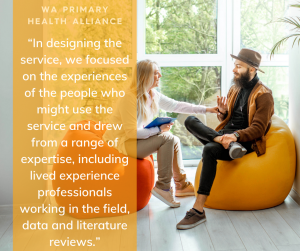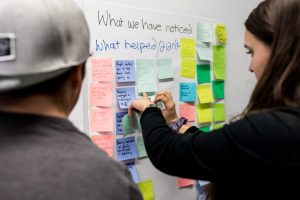Perth’s newest youth mental health outreach support service, Amber Youth Wellness, is the result of a comprehensive co-design process involving the combined expertise of young people, researchers and service providers from all walks of life.
WA Primary Health Alliance (WAPHA), the operator of the state’s three Primary Health Networks (PHN), engaged MercyCare to undertake a co-design process to design and deliver an outreach service to support young people with moderate to severe mental health issues in Perth’s northern suburbs.
The co-design process uncovered important insights into the ways in which young people want to engage with a mental health and wellness service.

A range of stakeholders were taken on the journey and provided opportunities to contribute throughout, helping shape the model as it progressed through various prototypes and iterations.
WAPHA Regional Manager, Sue Lee, said the co-design process had allowed us to bring stakeholders together, capturing key insights and learnings.
“Central to the process has been the understanding that it’s about a young person’s life, not just their mental health. It can be difficult sometimes for mental health to see itself in the backseat and not the driver’s seat.
“Amber Youth Wellness is empowering young people to play an active role in their own care,” Ms Lee said.
MercyCare CEO, Anthony Smith, said the process set out to design the service experience for young people and their families, including how and where they engage with us, how we communicate and involve them, and how we work with others to deliver excellent mental health care.
“We focused on the experiences of the people who might use the service and drew from a range of expertise, including lived experience, professionals working in the field, data and literature reviews. This enabled better framing of the design challenge before diving into ideas about how to design the service model.
“It was heartening to hear stakeholders referring to the Amber Youth Wellness model as something we collectively developed and would be collectively delivering.
“I’d like to thank our funding body, WA Primary Health Alliance, who enabled this co-design process to occur. It is a rare luxury to have the time to delve into a process of listening and noticing together, and even rarer that a funding body would be so keenly involved in that journey.

“The Youth Mental Health Outreach report has been an important component of the design process, documenting our approach to bringing diverse stakeholders together, holding space to listen, capturing key insights and testing of ideas through visual prototypes about how the service might be experienced by a young person with complex mental health needs.
“We will continue to engage with young people, our funder and other stakeholders to reflect on what is working well and which elements may need to be refined or completely re-worked.
“We anticipate that this service will continue to iterate and respond to changing circumstances, guided by the underlying understanding and insights of what young people facing significant mental health challenges are looking for in a robust, effective, supportive service,” Mr Smith said.
View the Youth Mental Health Outreach Project report.
Young people aged 12 to 25 can contact the service directly or be referred by their GP or other health professional.
This activity has been made possible through funding provided by the Australian Government under the PHN Program.
